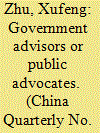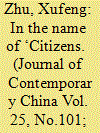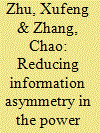| Srl | Item |
| 1 |
ID:
107296


|
|
|
|
|
| Publication |
2011.
|
| Summary/Abstract |
Think tanks in China simultaneously play advisory, academic and advocacy roles in the policy process. In this article, I recommend an analytical framework that evaluates think tanks by studying their specific activities in addition to their nature. Empirical data involving 301 think tanks in 25 provinces were collected through the China Think Tank Survey 2004. The 1998 regional Integrated Knowledge Development Index database was also used for the analysis. Based on these two independent sets of survey data, the article concludes that connections with the government and knowledge capacity in regions where think tanks are located are the two differing forces that drive China's think tanks to operate as either advisors or advocates. Moreover, these two determinants differentially influence the individual roles of the two types of think tanks.
|
|
|
|
|
|
|
|
|
|
|
|
|
|
|
|
| 2 |
ID:
147607


|
|
|
|
|
| Summary/Abstract |
The rise and fall of public intellectuals in contemporary China is essentially attributed to the ever changing state–society relations. The author demonstrates that some Chinese public intellectuals have developed a new strategy to promote policy changes in the Hu–Wen era through civic activism in the name of ordinary citizens, by abandoning their traditional capacity as experts or intellectuals. The article summarizes three specific actions of civic activism, namely, ‘petition for constitutionality review as citizens’, ‘provisional voluntary citizen groups’ and ‘netizen public welfare enterprises’. Cases have been studied to demonstrate that the policy entrepreneurship of public intellectuals in civic activism can be manifested as innovation and strategies that challenge the lacunae between policy and existing institutions.
|
|
|
|
|
|
|
|
|
|
|
|
|
|
|
|
| 3 |
ID:
113482


|
|
|
|
|
| Publication |
2012.
|
| Summary/Abstract |
This paper focuses on the institutional framework for sulfur dioxide emission information disclosure (SDEID) in power industries. The authors argue that mandatory and voluntary SDEID are two complementary regulatory instruments for emission reduction in the power industry. An analytical framework of SDEID with six facets is suggested in this paper to demonstrate relevant legal provisions and regulatory policies of mandatory and voluntary SDEID of power industries in the US. Empirical research shows that mandatory and voluntary SDEID of the power industry have been regulated simultaneously in the US. The foundation of power companies' willingness to disclose emission information voluntarily is the combination of mandatory scientific monitoring with market regulation in the current SDEID system in the US. In comparison, the SDEID of power industries has yet to be widely implemented in developing countries. Finally, the paper provides some implications to developing countries that plan to learn institutional arrangements from developed countries.
|
|
|
|
|
|
|
|
|
|
|
|
|
|
|
|